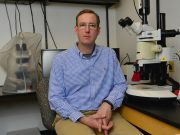New Mizzou company to produce promising spinal muscular atrophy drug
Shift Pharmaceuticals developed by team of MU researchers, Office of Technology Management and Industry Relations
July 26th, 2018
COLUMBIA, Mo. – Approximately one out of every 40 individuals in the United States is a carrier of the gene responsible for spinal muscular atrophy, a neurodegenerative disease that causes nerves to die and muscles to weaken over time. In 2014, Chris Lorson, an investigator in the Bond Life Sciences Center and associate dean of research in the University of Missouri College of Veterinary Medicine, and his team developed a molecule that was found to be highly effective in animal models exhibiting SMA. Now, testing of that compound has led to the founding of a new company, Shift Pharmaceuticals, and the possibility of the development of drugs that will improve outcomes for people with SMA.
“More than a decade of research has guided our fine-tuning of a potential therapeutic for SMA and what it does,” Lorson said. “We identified a genetic ‘switch’ that turns bits and pieces of the genetic code on and off. Using this information, we then developed a molecule called an antisense oligonucleotide, or ASO, that essentially is a synthetic string of nucleic acid that binds to a specific sequence in the SMN2 gene.”
In individuals affected by SMA, the survival motor neuron-1 (SMN1) gene is mutated and lacks the ability to produce a key protein that helps neurons function. Muscles that control walking or even lifting an arm often are profoundly affected as well as muscles important for breathing. Fortunately, humans have a nearly identical copy of the gene called SMN2; however, SMN2 normally only makes a small amount of the correct SMN protein. Lorson’s compound targets SMN2 and effectively “turns the volume” up for the replacement gene, allowing it to make more of the correct SMN protein.
“Our current treatment helps the body induce a backup mechanism to combat the disease and extends survival in mice with SMA giving them more mobility,” Lorson said. “This compound helps produce the right form of SMN, the one that was only produced at very low levels before. The mice are able to move around and live fairly normal lives.”
Early results of this research are promising. If additional studies are successful, researchers at Shift Pharmaceuticals hope to begin human clinical trials with the goal of developing new treatments for SMA. To move their compound closer to the clinic, Shift has recently received a Technology and Therapeutic Development Grant from the Department of Defense, through the Congressionally Directed Medical Research Program.
Therapeutics produced by Shift highlight the University of Missouri’s impact on the state’s economic development efforts, workforce development and job growth, quality of life improvements for residents, and commercialization of technologies through the MU Office of Technology Management and Industry Relations. During the past five years, companies commercializing MU technologies have secured hundreds of millions of dollars in investments and grants to advance their commercialization efforts.
Cure SMA, a 501c non-profit, provided initial funding for the discovery of this compound, as well as additional support from FightSMA, the Gwendolyn Strong Foundation, and the Muscular Dystrophy Association.
This research also highlights the power of translational precision medicine and the promise of the proposed Translational Precision Medicine Complex at the University of Missouri. The TPMC will bring together industry partners, multiple schools and colleges on campus, and the federal and state government to enable precision and personalized medicine. Scientific advancements made at MU will be effectively translated into new drugs, devices and treatments that deliver customized patient care based on an individual’s genes, environment and lifestyle, ultimately improving health and well-being of people.
Editor’s Note: For more on the story, please see: “A shift in focus: Lorson moves basic research to drug development”



 Photo:
Photo: